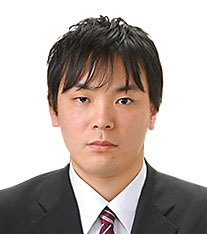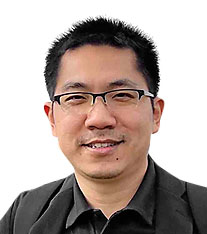- JST Home
- /
- Strategic Basic Research Programs
- /
 PRESTO
PRESTO- /
- project/
- Strengthening ICT Infrastructure for Social Change/
- [Platform Software] Year Started : 2023
[Platform Software] Year Started : 2023
Kazushi Kawamura
User-friendly Combinatorial Optimization System Utilizing AI Technology
Grant No.:JPMJPR23P1
Researcher
Kazushi Kawamura

Assistant Professor
Faculty of Science and Engineering
Waseda University
Outline
Ising machines have attracted attention as efficient solvers for combinatorial optimization. However, the necessity of modeling is a barrier for users. This research aims to propose a novel methodology to autonomously design Ising models representing practical combinatorial optimization problems. Two AI technologies, Boltzmann machine and reinforcement learning, will be utilized to achieve this aim. A reinforcement learning system with a set of Ising and Boltzmann machines is expected to gradually optimize Ising models through mutually searching for solutions and models.
Yo Kobayashi
Information processing using human tissue and its application to wearable systems
Grant No.:JPMJPR23P2
Researcher
Yo Kobayashi

Associate professor
Graduate school of Engineering Science
The University of Osaka
Outline
In Society 5.0, real-time human assistance through wearable systems is an important target. To realize this, small, edge computers are needed that can perform advanced, real-time information processing using AI of biological information. In this study, research will be conducted on information processing using human tissue as an intermediate layer of physical reservoir computing, to realize hardwareless and secure computing.
Koya Sato
Development of Localization-Free Spatio-Temporal Data Analysis Infrastructure
Grant No.:JPMJPR23P3
Researcher
Koya Sato

Assistant Professor
Artificial Intelligence eXploration Research Center
The University of Electro-Communications
Outline
Current localization-dependent spatio-temporal big data analysis systems have critical problems regarding maintenance costs for deploying IoT sensor terminals and privacy concerns. To deal with these problems, in this project, we design a data analysis method that does not require the location information of sensing devices, which is essential in the current spatio-temporal big data analysis. Our approach will predict the spatio-temporal characteristics of events based on relative coordinate estimation using features that implicitly express the relationship between terminals. We aim to realize a world where every data can be collected and utilized without delay.
Takehiro Sato
Reliable edge–cloud coordinated network robust to changing conditions
Grant No.:JPMJPR23P4
Researcher
Takehiro Sato

Associate Professor
Graduate School of Informatics
Kyoto University
Outline
The objective of this project is to realize an edge–cloud coordinated network for reliable provision of services in Society 5.0. Mathematical models for resource allocation and update scheduling that achieve high availability are constructed. The models consider both persistent events, such as traffic fluctuations, and sudden events, such as attacks and failures, comprehensively. Based on these models, this project develops network control methods and conducts implementation experiments. This project aims to contribute to the realization of a resilient ICT infrastructure.
Yang Cao
New Trust Enhancing Technologies for Large Language Models
Grant No.:JPMJPR23P5
Researcher
Yang Cao

Associate Professor
School of Computing
Institute of Science Tokyo
Outline
Large language models (LLMs) are revolutionizing our society, yet they pose significant challenges in terms of privacy, robustness, and potential misuse. This project endeavors to devise new trust-enhancing technologies for LLMs, bolstering their resilience in adversarial settings and mitigating the risks associated with their generated content.
Naoto Yanai
A Study on Attacks Utilizing Smart Contracts and Their Countermeasures
Grant No.:JPMJPR23P6
Researcher
Naoto Yanai

Principal Engineer
Technology Division
Panasonic Holdings Corporation
Outline
This study investigates feasible threats when an adversary utilizes smart contracts from the adversary’s standpoint. Especially, through discussion on criminal smart contracts implemented by an adversary for malicious activity, this study shed light on the effect of cyberattacks by smart contracts as well as their countermeasures from standpoints of the code of the smart contracts and usage history.
Essam Rashed
Interactive medical image diagnosis with chatbot assistance
Grant No.:JPMJPR23P7
Researcher
Essam Rashed

Professor
Graduate School of Information Science
University of Hyogo
Outline
This project demonstrates a pathway towards the use of deep learning models with chatbots assistance in medical image diagnosis. Multi-task image diagnosis models empower extended image knowledge extraction while large language models (LLM) technology will trigger the generation of expert-like medical diagnosis report. This research contributes to efficient utilization of AI in healthcare services where manpower shortage is expected to occur.
Peng Li
An Environment-Adaptive Giant Model Platform at the Edge
Grant No.:JPMJPR23P8
Researcher
Peng Li

Senior Associate Professor
School of Computer Science and Engineering
The University of Aizu
Outline
This project aims to build a giant model platform for edge devices based on the environmental perception technique, which jointly optimizes AI model design, cloud-edge coordination and privacy-enhancment mechnisums from the perspective of “by-Design”. Specifically, there are three research tasks: (a) Re-constructing giant AI models by dividing it into multiple expert models; (b) Expert model management based on environment perception; (c) Personalized expert models based on federated learning.
Xin Wang
Unified speech data processing framework for speaker privacy protection and fake audio detection
Grant No.:JPMJPR23P9
Researcher
Xin Wang

Project Associate Professor
National Institute of Informatics
Research Organization of Information and Systems
Outline
The era of infodemics calls for a speech data processing infrastructure capable of detecting AI-generated fake voices and protecting personal information in real human voices. However, in the current research community, fake voice detection and speech privacy protection are approached with separately designed principles and heuristics, which prevent the joint optimization and theoretical explanation of the performance of the two modules. This project aims to unify them using the likelihood ratio test and deep learning techniques, with the goal of finding a theoretically solid and joint optimization method for both modules. The research outcome is expected to accelerate the development of speech data processing infrastructure with high-level security and utility.













